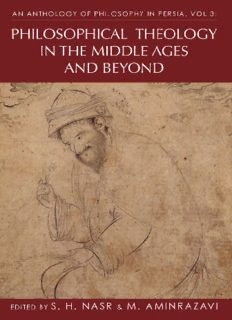
An Anthology of Philosophy in Persia, Volume 3: Philosophical Theology in the Middle Ages and Beyond PDF
Preview An Anthology of Philosophy in Persia, Volume 3: Philosophical Theology in the Middle Ages and Beyond
An Anthology of Philosophy in Persia Previously published volumes: An Anthology of Philosophy in Persia, Volume 1: From Zoroaster to ʿUmar Khayyām An Anthology of Philosophy in Persia, Volume 2: Ismaili Thought in the Classical Age An Anthology of Philosophy in Persia volume 3 Philosophical Theology in the Middle Ages and Beyond from Muʿtazilī and Ashʿarī to Shīʿī Texts seyyed hossein nasr and mehdi aminrazavi with the assistance of m. r. jozi I.B.Tauris Publishers london • new york in association with The Institute of Ismaili Studies london Published in 2010 by I.B.Tauris & Co Ltd 6 Salem Rd, London w2 4bu 175 Fifth Avenue, New York ny 10010 www.ibtauris.com in association with The Institute of Ismaili Studies 210 Euston Road, London nw1 2da www.iis.ac.uk In the United States of America and in Canada distributed by St Martin’s Press, 175 Fifth Avenue, New York ny 10010 Copyright © Islamic Publications Ltd, 2010 All rights reserved. Except for brief quotations in a review, this book, or any part thereof, may not be reproduced, stored in or introduced into a retrieval system, or transmitted, in any form or by any means, electronic, mechanical, photocopying, recording or otherwise, without the prior written permission of the publisher. isbn 978 1 84511 605 7 A full cip record for this book is available from the British Library A full cip record for this book is available from the Library of Congress Library of Congress catalog card: available Typeset in Minion Tra for The Institute of Ismaili Studies Persian poem typeset in Nastaliq designed by Mirjam Somers of DecoType Printed and bound in Great Britain by CPI Antony Rowe, Chippenham The Institute of Ismaili Studies The Institute of Ismaili Studies was established in 1977 with the object of promoting scholarship and learning on Islam, in the historical as well as contemporary contexts, and a better understanding of its relationship with other societies and faiths. The Institute’s programmes encourage a perspective which is not confined to the theological and religious heritage of Islam, but seeks to explore the relationship of religious ideas to broader dimensions of society and culture. The programmes thus encourage an interdisciplinary approach to the materials of Islamic history and thought. Particular attention is also given to issues of modernity that arise as Muslims seek to relate their heritage to the contemporary situation. Within the Islamic tradition, the Institute’s programmes promote research on those areas which have, to date, received relatively little attention from scholars. These include the intellectual and literary expressions of Shi‘ism in general, and Ismailism in particular. In the context of Islamic societies, the Institute’s programmes are informed by the full range and diversity of cultures in which Islam is practised today, from the Middle East, South and Central Asia, and Africa to the industrialized societies of the West, thus taking into consideration the variety of contexts which shape the ideals, beliefs and practices of the faith. These objectives are realized through concrete programmes and activities organ- ized and implemented by various departments of the Institute. The Institute also collaborates periodically, on a programme-specific basis, with other institutions of learning in the United Kingdom and abroad. The Institute’s academic publications fall into a number of interrelated categories: v vi An Anthology of Philosophy in Persia 1. Occasional papers or essays addressing broad themes of the relationship between religion and society, with special reference to Islam. 2. Monographs exploring specific aspects of Islamic faith and culture, or the contributions of individual Muslim thinkers or writers. 3. Editions or translations of significant primary or secondary texts. 4. Translations of poetic or literary texts which illustrate the rich heritage of spiritual, devotional and symbolic expressions in Muslim history. 5. Works on Ismaili history and thought, and the relationship of the Ismailis to other traditions, communities and schools of thought in Islam. 6. Proceedings of conferences and seminars sponsored by the Institute. 7. Bibliographical works and catalogues which document manuscripts, printed texts and other source materials. This book falls into category two listed above. In facilitating these and other publications, the Institute’s sole aim is to encourage original research and analysis of relevant issues. While every effort is made to en- sure that the publications are of a high academic standard, there is naturally bound to be a diversity of views, ideas and interpretations. As such, the opinions expressed in these publications must be understood as belonging to their authors alone. �� ������������������ �������� ����� ��������������������������� �� ���������������� ������� �� ��������������������������������� � � �� � � � ��� � � �� �������������������� ��������������������������������� ������ ���� ���� ���� ������������������ �������������������� ��� ���� � ���� � �� � � ���� There is no judge worthy to give judgment save the Truth, There is no judge worthy to give judgment save theTruth; ThTehreere iiss n on juodg mjuendt bgeymonde thne tju dbgmeeynto onf thde Ttrhuthe. judgment of the Truth. Whatever exists is as it should be, And that which should not be exists not. Whatever exists is as it should be, Nasīr al-Dīn Tūsī And that which should not be exists not. Naṣīr al-Dīn Ṭūsī Contents List of Reprinted Works xiii Note on Transliteration xv List of Contributors xvii General Introduction S. H. Nasr 1 Introductory Analysis M. Aminrazavi 14 part i. muʿtazilism Introduction S. H. Nasr 21 1. Abu’l-Hudhayl al-ʿAllāf Introduction S. H. Nasr 24 Selections (from Madhāhib al-Islāmiyyīn) 26 2. Ibrāhīm al-Naẓẓām Introduction S. H. Nasr 31 Selections (from Madhāhib al-Islāmiyyīn) 33 3. Qāḍī ʿAbd al-Jabbār Introduction M. Aminrazavi 38 The Book that Makes Others Superfluous (from al-Mughnī fi’l-abwāb al-tawḥīd wa’l-ʿadl) 40 part ii. later sunni theological thought Introduction S. H. Nasr 55 1. Imam al-Ḥaramayn Juwaynī Introduction M. Aminrazavi 58 The Book of Guidance (from Kitāb al-irshād) 61
